Peter MALONE
Saturday, 18 September 2021 19:50
Adventures of Mark Twain, The
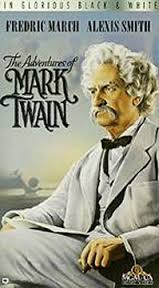
THE ADVENTURES OF MARK TWAIN
US, 1944, 130 minutes, Black and white.
Frederic March, Alexis Smith, Alan Hale, Donald Crisp, John Carradine, C. Aubrey Smith, Walter Hampden, Percy Kilbride.
Directed by Irving Rapper.
The Adventures of Mark Twain is an entertaining biography of the famous author, Samuel Clemens, best known by his pen-name, taken from the boats on the Mississippi, Mark Twain. There is some dispute as to whether this is an accurate biography or rather some spinning of yarns in the vein of the author, along with some liberties taken with the dramatisation of his life and relationships.
He is played with gusto by Frederic March. Alexis Smith is his wife. A strong group of character actors portray various personalities in his life, including John Carradine as the author Bret Harte.
The film was released during World War II, also serving something as something of a morale-booster.
1. How much biography? How much portrait? Entertaining? A piece of Americana?
2. Warner Brothers style, black-and-white photography, use of studio sets, fantasy and memories? The musical score?
3. Audience knowledge of Samuel Clemens, of Mark Twain, his life, writings, his characters? His personality? His achievement and status?
4. The structure of the film: the prologue, Halley’s Comet? The early years, on the river, the affinity with characters like Huckleberry Finn and Tom Sawyer? The old Mark Twain and his reminiscences, highlights of his life?
5. The South, its style, the 19th-century? The families? Slavery? Relationships between black and white? Samuel as a boy, growing up? His exasperation? The newspaper, the satiric touch? The river, the story, his becoming Mark Twain?
6. The river, the boat, Sam going away, the ship, steering? The captain and his experience? Moving through the fog and other manoeuvres? The portrait of the young Sam on the river?
7. Going to the west, the mines, the newspapers? The Civil War? The episode of the frog, the bets, the amplification of the story? The rivalry with Bret Harte?
8. Writing the story, its going to New York? The introduction of the joke? Talk and laughter? Success? The beginning of his writing career?
9. Courting Livy, the family, snobbery? The accident his staying? The marriage? The death of the child? Support over the years? His daughters?
10. His writings, the characters of Tom Sawyer and Huckleberry Finn?
11. The character of Livy, background, encounters with Sam, his courting her, the marriage, fidelity, her encouragement, continued support.
12. Samuel Clemens going to Oxford, the conferring of the degree, importance of the speech by the Vice Chancellor?
13. Steve Gillis, his friendship with Sam, a company into the West, jovial character?
14. The agent, his hard work for Clements, trying to discover the truth behind the publication of the story?
15. The publication and difficulties for the life of Ulysses Grant?
16. Mark Twain on tour, around the world, his performances and storytelling?
17. Bret Harte, writer, in the West, the frog competition, Sam Clemens’ bet, the rivalry?
18. The nature of the anecdotes, the dramatisation of history, not always accurate, but in the vein of Mark Twain’s yarns and storytelling?
Published in Movie Reviews
Published in
Movie Reviews
Tagged under
Saturday, 18 September 2021 19:50
Confession, The/ 1998
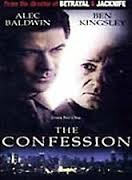
THE CONFESSION
US, 1999, 114 minutes, Colour.
Alec Baldwin, Ben Kingsley, Amy Irving, Jay O. Sanders, Richard Jenkins, Boyd Gaines.
Directed by David Hugh Jones.
The Confession is an arresting drama, focusing on two different stories and bringing them together.
The first concerns Ben Kingsley and his wife, played by Amy Irving, a devout Jewish couple. Their daughter suffers a bout and is hurried to the hospital, to the emergency Ward, only to find that the registrar, the nurse and the doctor, seemingly overworked, make the couple wait in line. The girl dies and the devout Jew decides that he will wreak justice on those who killed his daughter. And he does.
The other story concerns a hotshot lawyer played by Alec Baldwin, smart in court, cultivating connections, especially with big business and politicians. He is asked to take on the Jewish case and, in getting to know the husband and the wife, and with the aid of his investigator who is something of conscience for him, he decides that he will accept the guilty plea by the Jew who wants to be sentenced to prison – but there is a complication because he is the accountant for a firm with corrupt practices, especially for the environment and the water supply for New York City. Those powers that be want the Jew to plead not guilty, and get off the charge by reason of insanity, and therefore not able to testify against them.
The lawyer does the right thing, to his amazement, and for integrity in a corrupt system.
The film was directed by David Hugh Jones, director of comparatively few films but including Robert De Niro in Jackknife.
1. A little-known film? A serious film, moral issues? The strong cast?
2. The American city, the 1990s? Law, corruption, the environment? Ambitions? Deals?
3. Themes of integrity, lack of integrity? Roy and his career, ambitions to be DA, the challenge to his moral stances, the possibility of a change in redemption?
4. The parallel stories at the beginning, Roy and his work on the court, putting pressure on the prosecutor? The corrupt policeman in court, the truth, getting him off? The reasons? The contrast with the story of the Fertig family, Harry and his work, accountant, love to his wife, love his son, devout and prayerful? The two stories coming together?
5. Roy, his age, experience, family background, the influence of his father? The law? In court, the rivalry, the friendship, playing squash together? The pressure on the lawyer, the reasons, political connections, financial connections? Their discussions? The role of the judge in court, friendship with Roy, the affair? His friendship with Cass, his connections? Being introduced to Jack Renoble? The parties, the talk, the influence? Roy and his assistant, getting photographs, compromising photographs of the prosecutor, their being sent, his wife seen them, his physical and moral collapse?
6. Harry and Sarah, Jewish, devout, the scenes of prayer? Accountant and connections? His integrity? Love his child, the long wait – and Sarah’s explanation of IVF attempts for pregnancy? The illness of the boy, the fever, hurrying to the hospital, going to Emergency, the registrar holding the month, sitting with everyone else, the hard attitude of the nurse, of the doctor, their having their smoke break and being accosted by Harry? Going elsewhere, the boy dying?
7. Harry, righteous, the role of the law, vengeance, Jewish tradition? Guilt and responsibility? The visualising of his killing the three victims? Because they did not care? Giving himself up? Sarah and her dismay, the puzzle?
8. Roy and his being attached to the case, the influence of Cass and Renoble, meeting with them? Their wanting a guilty verdict? Discussions with Harry, is not helping his case? His wanting to plead guilty, accepting responsibility? The discussions between Roy and Harry and their effect on Roy? When did Roy’s conversion experience start, why?
9. Roy’s assistant, detective work, in the office, partnership, asking conscience questions, the baptism with whiskey sequence in the bar and its meaning? Is challenging Roy?
10. Sarah, talking, opening up to Roy? The attraction? Roy and women, with the judge? Sleeping with Sarah, her telling Harry, Roy telling Harry?
11. Cass, personality, political and financial connections, callous in his attitude towards people? His advice to Roy? Renoble, finance, his deals, the significance of the case and Harry’s testimony?
12. The challenge to Roy, is assisted in the information? The issue of the pollution of the water, the costs to purify, the nature of the pollution? Buildings and permits?
13. Grenoble and Cass, wanting Harry to plead not guilty, and therefore unable to testify against them in further cases? The links, the paper trail, Harry documents? Their wanting Harry to be judged as having impaired mental capacity?
14. Harry, the attempted suicide, in hospital, his apologies? His life in jail?
15. The judge, Harry in the court, the prosecutor and the objections, the judge being fair, allowing statements Harry, from Roy? The plea of guilty? The short time taken, the sentence?
16. Harry, the sentence, seen it is just? His concern about justice and his child, but his neglecting Sarah?
17. The effect on Roy, a future or not within the legal system, gaining integrity?
Published in Movie Reviews
Published in
Movie Reviews
Tagged under
Saturday, 18 September 2021 19:50
Boys and Girls
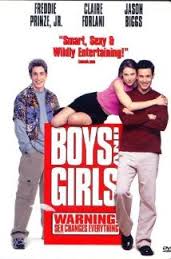
BOYS AND GIRLS
US, 2000, 94 minutes, Colour.
Freddy Prinze Jr, Claire Forlani, Jason Biggs, Amanda Detmar, Alyson Hannigan.
Directed by Robert Iscove.
Boys and Girls is a young adult comedy, 1990s style. It begins with two children who encounter one another on a plane, she very superior, he very awkward. By chance, they encounter each other when they go to college, mellow about their differences, begin to be friends, confiding in each other, especially about relationships. He is preoccupied with science, she about her love affairs.
There are some amusing episodes in which each of them has relationships, he developing from a shy bespectacled type to more outgoing, she mellowing. When it is almost too late, they realise that they love each other – and happily ever after.
Freddy Prinze Junior is he, Claire Forlani is she. The director, Robert is scope, is known for She’s All That, also with Freddie Prinze.
1. A popular film for teenagers and young adults? Characters, identity, relationships, love, denial, sex, finding one’s true partner?
2. The locations, Los Angeles, San Francisco, the Berkely University campus, the landmarks of San Francisco, the golden gate bridge? Filmed during classes on the campus and with actual students in the background?
3. The title, boys and girls in general, differences, similarities, relationships?
4. The only on the plane, Ryan, Prem, prim, exacting in language with the flight attendant? Impatient on leaving, Jennifer and her sitting next to him, his critical remarks, the interactions between the two, her liveliness, criticisms of him, talking about her period and his reaction?
5. The transition to 4 years later, the football game, Ryan as the mascot, his head being docked off, the encounter with Jennifer? The clashes again, each calling the other dumb?
6. Berkely, the campus, Ryan and his relationship with Betty, long distance, Jennifer walking by? The later breakup of Ryan and Betty?
7. Ryan, Hunter in the chest, getting out, his attitude towards life, their sharing the room, conversations, discussions about relationships? Hunter and his real name, Steve? His lack of success with girls? Inept, saying the wrong thing, going to the dancing class…?
8. Jennifer, who relationships, on and off, sexual, Ryan and his reaction? Her continually confiding in him? Their friendship? Jennifer and Amy, the discussions, Amy on the kiss, her reaction, Amy and her psychologist and talking about Jennifer?
9. Studies, life in Berkely, dates, going out, clubs, dancing?
10. Ryan, serious, spectacles, his work and engineering, study? Gradually mellowing with relationships and learning about himself? Yet proper? In love with Jennifer, yet both of them denying it, is always backing down? Coming to Jennifer’s rescue, pretending that he was her brother, the mother was sick and Jennifer getting out of the date?
11. Jennifer, the passing of the years, studies, her graduation? The difficulties with relationships, with Michael and the band, being devastated, the later friends, at the table with Ryan, Amy and Steve, his outrageous remarks? Jennifer and her tattooed friend?
12. Looking at the golden gate, the discussions, matters, ease with each other, going for walks? The eventual night together? The aftermath? Who wanting to deny it? Right going along with her? The discussions, are going to Italy, his going back home?
13. In the car taxi, the executive and her good advice, Jennifer to getting out, trying to track down Ryan, Steve giving her the information, going to the plane, they’re talking from the different seats, the flight attendant and exasperation, eventually sitting together and the happy ending?
14. The character of Steve, gawky, proud of himself, not relating, finally connecting with Amy? Amy and her relationships, breaking up with Ryan, her support of Jennifer?
15. A film of the 1990s, on the verge of the 21st century? Attitudes of young people torch relationships, sexuality, casual and permissive, long-term commitment?
Published in Movie Reviews
Published in
Movie Reviews
Tagged under
Saturday, 18 September 2021 19:50
Aladdin and the King of Thieves
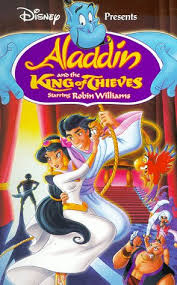
ALADDIN AND THE KING OF THIEVES
US, 1996, 80 minutes, Colour.
Voices : Robin Williams, Scott Wininger, Linda Larkin, John Rhys Davies, CCH pounder.
Directed by Tad Stones.
Aladdin was a great success for Disney studios in 1993, following on the renewal of Disney’s impact with The Little Mermaid in 1989 and Beauty and the Beast in 1992, the latter even winning an Oscar nomination for Best Film. The Lion King was to be released the following year.
Aladdin immediately became part of Disneyworld and, more latterly, a Broadway musical.
There was a sequel in 1994, The Return of Jaffar, designed for television viewing and home viewing.
This film, for DVD release, takes up the story and has some heroics for Aladdin, the yearnings of Princess Jasmine and her help in his quest, his discovery of his father as Ali Barber and the activities of the 40 thieves.
Younger audiences will enjoy all of this. They will also enjoy Robin Williams reprising his role of the genie, with all the madcap illustrations, the various forms the genie took, with references to history, the movies, even Woody Allen, and the zany lyrics of his songs as well as of dialogue. It is hard to keep up with him, probably needing a second viewing to appreciate all his comedy. This is the part for adult enjoyment.
1. An entertaining sequel to Aladdin? Capturing its original spirit? Characters, plot, adventures, crazies?
2. The animation style, backgrounds, lavish illustrations, the characters, the adventures, the action and the Island, the Hand of Midas? And the variety of impressions of the genie?
3. The screenplay, characterisations, relying on the past but standing alone? The further development of the story? The songs, illustrating each of the central characters? The final parity during the credits of the speech from alien, Games Over Man?
4. The character of Aladdin, age, experience, poor, love the Jasmine? The preparation for the wedding? Is wondering about his father and whether he would be a good father? The death of his mother? The appearance of the Oracle, the possibility of one question, asking whether his father was alive? The truth? Jasmine encouraging him on his quest? His father with the 40 thieves? The carpet, the monkey, the bird, accompanying him? The patter? Arriving at the island, discovery of the truth about his father, confrontation, reconciliation? The 40 thieves, the challenge, his succeeding, the villain falling into the ocean? The return for the wedding? The father and his motivations? Wanting to find the Oracle? The truth about the Hand of Moses, the disappearing island? Going to find the hand? Aladdin Jasmine of the others on the carpet? The discovery of the hand, not touching it, it’s turning everything to gold? The 40 thieves and then not realising this, the villain and his being transformed to gold and falling to the sea? The father, his pride in his son, the wedding?
5. Jasmine, in love with Aladdin, her relationship with her father, the preparation for the wedding, sending Aladdin on his quest, finally accompanying him, helping?
6. The carpet, the monkey, the bird, the comedy?
7. Robin Williams voicing the genie? Character, zany? The quick jokes and repartee? The variety of disguises, shapes and characters, including Woody Allen and Groucho Marx? The songs? The modern touches – with the machine gun? Williams re-creating his original character?
8. The 40 thieves, coming into the city, the disguise, the robberies? Losing their loot? The headquarters? Open sesame? The leadership, the role of the father, command, the challenge and the fight? The greed?
9. The Sultan, love for his daughter, being persuaded about the wedding, the happy ending?
Published in Movie Reviews
Published in
Movie Reviews
Tagged under
Saturday, 18 September 2021 19:50
Goats
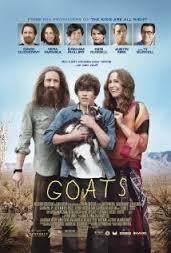
GOATS
US, 2012, 94 minutes, Colour.
Vera Farmiga, David Duchovny, Graham Phillips, Justin Kirk, Ty Burrell, Keri Russell, Anthony Anderson, Dakota Johnson, Alan Ruck.
Directed by Christopher Neil.
Goats is an offbeat drama, a story about ageing hippies as well as a teenager and his coming of age.
The goats in the title refer literally to goats, looked after by the Goat Man, played by the very hirsute David Duchovny, quite unrecognisable until he shaves and has a haircut at the end. He works for a wealthy woman, played by Vera Framiga, who takes in a toyboy type, played by Justin Kirk. She is very much into New Age therapies, yoga, primal screams…
But the main story is about her son, played by Graham Phillips, precocious in some ways, reliant on the Goat Man as a mentor, into drugs, loving his mother but exasperated by her, against the toyboy. He is about to go to a special Preparatory school in New England.
The film is interesting showing his life in the school, his friends, antagonisms, trying to get drugs. He also makes contact with his father whom he has not seen for years as well as his new, pregnant wife. They receive him well and he sees another side of life, not influenced by the reactions of his mother.
He returns home, goes with the Goat Man on a visit to Mexico which involves drugs and the Goat Man disappears. However, he does return, ousts the toyboy, links up with the mother – and the boy, still loving his mother, is able to find his complementary family with his father, his wife and his half brother.
1. The title? The Goatman? The actual goats? In themselves, led, the treks? Symbolic?
2. Arizona and the landscapes, the home, the border territory, Mexico? The desert, the mountains? The contrast with New York? The school? The musical score?
3. Ellis’s story, his age, schooling at home, friends, his relationship with his mother, her moods? His friendship with Goatman and his guidance, advice, supplier drugs? The discussions? Going on the treks? Going to Mexico, the drug issue, his disappearance? The drugs not posted and the later explanation from the postman? Live at home, preparing to go to college, his intelligence, clever, reading? His absent father, Fucker Frank? No connections? Later meeting him, the connection, with his wife, her pregnancy? The change in attitude of each of them? The criticism of drugs, drinking? His enjoying their company, the meal, supporting them, the future? A new brother? Going with them to Europe? his age, experience, drugs and dependence?
4. The Goatman, Javier? His real name? The hippie style, his past, his knowledge of goats, the treks, friendship with Ellis, his advice? Jobs around the house? Relationship with Wendy? Her lover and his eccentricities, the clashes? Seeing the lover and the sexual encounter with the man? Going on the treks, going to Mexico, the connections in Mexico, the town, the drug situation, his disappearing? Returning, changing his appearance? His motivations? His hair, ordinary? Ellis returning, their friendship? The lover going? The final image and Wendy pregnant?
5. Wendy, her moods, hippie, plenty of cash and knowing what was there but not a good administrator? The separation from Frank? Ellis and his growing up? Being a loving mother yet narcissistic, New Age and going to Sidona, the gurus, the primal scream? Not phoning her son at school? Her relationship with her lover, sharing with him, ousting him?
6. Ellis going to college, his roommate, the clashes, discussions, the issues of drugs? The fight and the roommate kicking in the groin? The teacher and his supervision, knowing his father, wanting some discipline? Helping the roommate with his exam? The need for drugs, their not being sent, the postman and the later explanation? Seeing the girl, talking with her, her reputation, the library, the discussion about books and The Great Gatsby, The Grapes of Wrath? The bond with her, the connections, the abrupt break off?
7. Frank, in himself, with his new wife, the past, marriage, pregnancy? The visit, the meal, taking an interest, their walks together? The boy who stole the bike, the confrontation in the town and retrieving the bike? The wife, pregnant, the meal, nice? Anticipation of the baby? The effect on Ellis, the holiday?
8. The lover, the toyboy, his attitudes, gay behaviour with the old man, Wendy’s requests to sharing, the gurus? Not liking Ellis? The clashes with Goat Man?
9. Ellis, his background in overcoming it, his new discoveries, change, the future?
Published in Movie Reviews
Published in
Movie Reviews
Tagged under
Saturday, 18 September 2021 19:50
Restraint
RESTRAINT
Australia/UK, 2008, minutes, Colour.
Travis Fimmel, Stephen Moyer, Teresa Palmer.
Directed by David Denham.
Restraint is an Australian thriller, mainly a three-hander, as a young man rescues his girlfriend from a club and goes on the run. He is quick on the draw and shoots an attendant at a service station. The couple then find an old mansion, rather Gothic in its interiors, and the owner who is agoraphobic.
Most of the film is cat and mouse interactions with the three, the forcing of the agoraphobic man outside and the effect on him, the changing sympathies of the girl, the aggression of the young man on the run. There are some interruptions from outside, especially the police wanting to come in. The young woman has to pretend to be the agoraphobic man’s fiancee in order to go to the bank and cash a cheque.
There are a couple of twists, especially in the character of the agoraphobic man and his history and the lies that he has told to his captors.
Travis Fimmel was a model who went to the United States and became an actor, featuring in the television series The Vikings. Teresa Palmer also went to the United States but has made a number of films at home, including Wish You Were Here. Stephen Moyer is a British actor best known for his continuing role in the American series True Blood.
1. Australian production, cast? The contemporary crime thriller set in a Gothic building?
2. The locations, the Australian town, the countryside, the mansion? The contrast with cars, service stations, the bank? The interiors of the house, baroque, sinister, the rooms, the basement? The musical score?
3. The title, its variety of meanings as supplied to each of the characters, Ron and his lack of restraint and the consequences, Dale and her way of life, dependent on Ron, dependent on Andrew, who finally been trapped in the building? Andrew, his agoraphobia, staying within the house, restrained by the intruders, the dominance of his father in the past, his breaking out of the restraints, his murderous nature, his sadistic imprisonment of Dale?
4. The credibility of the basic situation, Dale and her past, in the strip club, the domination of her boss, the relationship with Ron, his killing them boss? Their going on the run? At the service station, not having enough money, the sexual encounter with the owner, Ron and his confronting him, shooting him? Their escape, finding the mansion?
5. The film’s development of the character of Ron, his background, self-image, his later telling his story to and true? Behaviour is a thug, love for Dale, rescuing her? Violent and lack of control? Shooting people and willing to do so? His behaviour in the house, dominating Andrew, getting wanting yet wanting some kind of conversation? The relationship with Dale and yet using her to get information on money? The arguments, the retorts? His response to Andrews threats? Going to the basement with Andrew for the document, his being shut in comic emerging, the pursuit of Andrew? Dale’s return, his giving her a choice, her choosing Andrew, his putting her in the car, the ignition on, daring Andrew to come out of the house and save her? And returning on him, attacking him, Dale killing him?
6. Dale, her past, in the club, her being rescued, had not wanting people killed, her offer to the owner of the service station, the sexual encounter? Going to the house, dealing with a Ron? His maiden her declare that she loved him? Her interest in Andrew, his sympathy, the planned for the money, his making her look like his fiancee, her signature, going to the bank, address, the bank manager recognising her, the return, the police, her handling the situation? The sexual encounter with Andrew? At Ron’s urging to get information? Her own willingness? Her having to make a choice between Ron and Andrew, Ron’s attempt to kill her, Andrews rescue, who discovering the truth, her being restrained in the house by Andrew?
7. Andrew, the first meeting, the agoraphobia? His allowing Ron and Dale into the house? His being subdued? His telling his story, killing his father in the body buried? Run believing him? The story of the fiancee? Her going abroad? His wealth? The issue of money, organising Dale to go to the bank? His sexual encounter with her? His agility within the house, the chasers, the chasers, the subduing Ron, yet not totally? His being dared to go out of the house? His going to rescue Dale, attacking Ron? His confining Dale to the house? His madness?
8. At the service station, the man, the money, his demands, succumbing to Dale’s seductive suggestion, his death?
9. The police, coming to the house, the questions, Andrew and the plausibility of is not coming out, or letting them in?
10. A satisfactory three-hander in the confinements of the house?
Australia/UK, 2008, minutes, Colour.
Travis Fimmel, Stephen Moyer, Teresa Palmer.
Directed by David Denham.
Restraint is an Australian thriller, mainly a three-hander, as a young man rescues his girlfriend from a club and goes on the run. He is quick on the draw and shoots an attendant at a service station. The couple then find an old mansion, rather Gothic in its interiors, and the owner who is agoraphobic.
Most of the film is cat and mouse interactions with the three, the forcing of the agoraphobic man outside and the effect on him, the changing sympathies of the girl, the aggression of the young man on the run. There are some interruptions from outside, especially the police wanting to come in. The young woman has to pretend to be the agoraphobic man’s fiancee in order to go to the bank and cash a cheque.
There are a couple of twists, especially in the character of the agoraphobic man and his history and the lies that he has told to his captors.
Travis Fimmel was a model who went to the United States and became an actor, featuring in the television series The Vikings. Teresa Palmer also went to the United States but has made a number of films at home, including Wish You Were Here. Stephen Moyer is a British actor best known for his continuing role in the American series True Blood.
1. Australian production, cast? The contemporary crime thriller set in a Gothic building?
2. The locations, the Australian town, the countryside, the mansion? The contrast with cars, service stations, the bank? The interiors of the house, baroque, sinister, the rooms, the basement? The musical score?
3. The title, its variety of meanings as supplied to each of the characters, Ron and his lack of restraint and the consequences, Dale and her way of life, dependent on Ron, dependent on Andrew, who finally been trapped in the building? Andrew, his agoraphobia, staying within the house, restrained by the intruders, the dominance of his father in the past, his breaking out of the restraints, his murderous nature, his sadistic imprisonment of Dale?
4. The credibility of the basic situation, Dale and her past, in the strip club, the domination of her boss, the relationship with Ron, his killing them boss? Their going on the run? At the service station, not having enough money, the sexual encounter with the owner, Ron and his confronting him, shooting him? Their escape, finding the mansion?
5. The film’s development of the character of Ron, his background, self-image, his later telling his story to and true? Behaviour is a thug, love for Dale, rescuing her? Violent and lack of control? Shooting people and willing to do so? His behaviour in the house, dominating Andrew, getting wanting yet wanting some kind of conversation? The relationship with Dale and yet using her to get information on money? The arguments, the retorts? His response to Andrews threats? Going to the basement with Andrew for the document, his being shut in comic emerging, the pursuit of Andrew? Dale’s return, his giving her a choice, her choosing Andrew, his putting her in the car, the ignition on, daring Andrew to come out of the house and save her? And returning on him, attacking him, Dale killing him?
6. Dale, her past, in the club, her being rescued, had not wanting people killed, her offer to the owner of the service station, the sexual encounter? Going to the house, dealing with a Ron? His maiden her declare that she loved him? Her interest in Andrew, his sympathy, the planned for the money, his making her look like his fiancee, her signature, going to the bank, address, the bank manager recognising her, the return, the police, her handling the situation? The sexual encounter with Andrew? At Ron’s urging to get information? Her own willingness? Her having to make a choice between Ron and Andrew, Ron’s attempt to kill her, Andrews rescue, who discovering the truth, her being restrained in the house by Andrew?
7. Andrew, the first meeting, the agoraphobia? His allowing Ron and Dale into the house? His being subdued? His telling his story, killing his father in the body buried? Run believing him? The story of the fiancee? Her going abroad? His wealth? The issue of money, organising Dale to go to the bank? His sexual encounter with her? His agility within the house, the chasers, the chasers, the subduing Ron, yet not totally? His being dared to go out of the house? His going to rescue Dale, attacking Ron? His confining Dale to the house? His madness?
8. At the service station, the man, the money, his demands, succumbing to Dale’s seductive suggestion, his death?
9. The police, coming to the house, the questions, Andrew and the plausibility of is not coming out, or letting them in?
10. A satisfactory three-hander in the confinements of the house?
Published in Movie Reviews
Published in
Movie Reviews
Tagged under
Saturday, 18 September 2021 19:50
Ride with the Devil
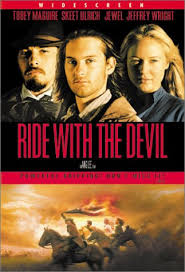
RIDE WITH THE DEVIL
US, 1999, 128 minutes, Colour.
Toby Maguire, Skeet Ulrich, Jeffrey Wright, Jim Caviezel, Simon Baker, Jonathan Rhys Meyers, Tom Wilkinson, Jewel, Celia Weston, Mark Ruffalo.
Directed by Ang Lee.
Ride with the Devil is a Civil War story, set in the South among the Confederate forces.
It does not focus on the war in its wide sweep, rather focusing on a small group of young men. The film opens with a wedding, the genteel life in the South, the role of the blacks, the acceptance of slavery and the animosity towards abolitionists.
The main two young men are played by Toby Maguire, son of a German migrant who sides with the Union, and Skeet Ulrich from the southern family. They get caught up in a squad led by Jim Caviezel, with the fanatic and cruel member played by Jonathan Rhys Meyers. They also meet with an older man and his negro friend, Simon Baker and Jeffrey Wright.
They become involved in skirmishes, take prisoners, try to get hospitality through the land where they are pursued by Union forces. They settle for the winter in caves. A young widow, Jewel, becomes friendly with the man, bringing them their food, and one of them falls in love with her. However, he is injured, and dies during the treatment. The young woman is pregnant and the other young man takes her to safety, being forced into marrying her and caring for her and her child.
The main and strong action sequence is a group of r and the raiders going into the north, to Lawrence Kansas, and massacring the inhabitants.
The war ends and the people of the South having to settle down into a new era.
The film was directed by Ang Lee, who made his mark in his native Taiwan with The Wedding Banquet and then moved to England to direct Jane Austen’s Sense and Sensibility, then to the US with The Ice Storm and then this film. Lee achieved great international success with the versatility of his films, winning an Oscar for Best Foreign Language with Crouching Tiger, Hidden Dragon, then Oscars for directing for Brokeback Mountain and The Life of Pi, winning the Golden Lion in Venice for Brokeback Mountain and Lust, Caution.
1. The Civil War? Audience interest in the Civil War? In the South and the confederacy? In the North and the Union?
2. The scope of the film, characters in action, the focus on a group rather than military activity?
3. The work of the director, is range of films, versatility?
4. The title, the focus on the characters, the Civil War?
5. The visuals, towns and the countryside, the seasons? The musical score?
6. The focus on the two young men, Jake and Jack Bull, the life before the war, their friendship? In the South and its mentality? The families, the opening celebration? Issues of slavery, racism, abolition? civil rights? The disunity of the United States?
7. The characters, Jack Bull and his age, experience, family, friendship? Jake, German migrants, his father and his support of the union, local reaction
against him? The friendship of the two and the bonds?
8. The raiders coming from the north, the Jayhawkers, Quantrell, the destruction of the South, the cry of of vengeance? Culminating in the big raid on Lawrence, Kansas, the destruction, the frenzy, the killings, the heap of dead black men?
9. The reading group, Black John and his courage, leadership, his underlings, the violence of the raids, the attack on the Federal is, the animosity? Pitt and his fanaticism, George and Daniel, part of the group, the presence of a black man in a southern group, the raids?
10. The taking of prisoners, the issue of Adam, Jake writing the letter, giving him his freedom to carry it, his return home, killing Jake’s father?
11. The possibilities for shelter and food, Mrs Clark and her caution, the young girl, the men at the table, the attack, the women being allowed to pass through? The attack?
12. Sue Lee and her story, marriage, widowed? Helping with the food? Attraction to the two men? Jack Bull and his attraction, planning for the proposal, the sexual encounter, resulting in the pregnancy? The attack, the escape? Going to the farm, shelter? Sue Lee and her pregnancy, the birth, the assumptions that Jake was the father?
13. The visualising of the raids, the years passing, the re-grouping, the life in the cave, the snow in the winter?
14. Jack Bull and his being wounded, no doctor to help, the possibilities the gangrene, the attempt at removing his leg, his death?
15. Jake, being wounded, going to the Brown farm? Recuperating?
16. Pitt, his behaviour in the raid on Lawrence, his threatening Jake? In the cafe? His retreating? The later visit, Jake going to confront him, the crisis?
17. Black John and his harshness, Pitt in his madness?
18. George, his activities, participating in the raids? Bringing Daniel, Jake and Daniel becoming friends, Daniel’s story, after the war, his organising the minister for the wedding? His working the fields?
19. Settling down, the baby, Jake’s responsibilities?
20. The sense of hostility between North and South, for the duration of the war, the animosity towards Lincoln’s policies, against the abolitionists? Families and divisions, vengeance? The film offering an experience of war and the aftermath?
Published in Movie Reviews
Published in
Movie Reviews
Tagged under
Saturday, 18 September 2021 19:50
Man who Laughs, The/ L' Homme qui Rit
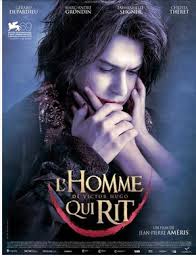
THE MAN WHO LAUGHS/L’HOMME QUI RIT
France, 2012, 95 minutes, Colour.
Gerard Depardieu, Marc- Andre Grondin, Emmanuelle Seigner, Christa Theret.
Directed by Jean- Pierre Ameris.
The Man Who Loves is based on the novel by Victor Hugo. It is set in pre-revolutionary times, the story of a boy who was disfigured so that his mouth looks as if he is laughing.
At the opening of the film, he is abandoned by the captain who disfigured him, leaving him to wander in the snow when he comes across a mother and daughter, rescuing the little child, eventually finding Ursus, who is a salesman of tonics in the French countryside. He is played by Gerard Depardieu, as usual, defective in his way.
Ursus cares for both children, finding that the little girl is blind. As he goes on his travels, spinning stories about his goods, bedding wives, he performs one day and the little boy comes out, mimicking him. Ursus does some quick thinking and says that the boy’s face is the result of devil possession and an exorcism.
The boy grows up (Marc- Andre Grondin), the girl is very attached to him, loving him. They arrive in Paris and find themselves in the middle of the circus, and becoming very successful with their performances in plaintive stories, using the boy and the girl. A countess comes to see the play and demands his presence. It emerges that the boy is son of a nobleman and inherits his castle. Overwhelmed by the luxury, he wants to do something for people and goes to Parliament where he is laughed at, something which happens also at the ball and his reception.
The majordomo who found the boy and realised who he was sends Ursus and the girl away. However, the young man seeks them out, only to find that the girl has tried to kill herself because of her love for him. And they go on their way.
1. A classic story, history, costume drama?
2. The re-creation of the period: the sea, winter and snow, the caravan, travelling the French countryside, the villages, the city, the circus, the castle, the Parliament? Costumes and sets? Decor? The musical score?
3. The title, Gwynplaine, his face cut, the cruelty of the captain, the doctor? The reason for the cutting of the boy’s face, the execution of his father?
4. The boy, at the boat, the captain sending him away, his walking through the snow, freezing, finding the baby and the mother, carrying the baby, finding the caravan of Ursus, being received, the little girl being blind? Travelling together, surviving, the passing of the years?
5. Ursus going into the village, his spiel, his potions, talking with the people, his knowledge, the woman and her knowledge, his credibility? The sexual encounter with the woman? Gwynplaine and his coming out on the platform, mimicking Ursus, the people laughing, Ursus and his quick thinking, the explanation of the exorcism, the effect on the boy’s face? The people paying up? On the road for years? The transition to the teenage Gwynplaine, to the blind Dea, the two growing up together, the bond, this love, sexuality dimension, the hesitation? Ursus and his watching over them.
6. Travelling to the city, the circus, the range of characters, their being accepted, the caravan in the midst, the performances? The development of the dramas? The stage, the sets, Gwynplaine and Dea both performing? The response of the crowds, the reputation?
7. The Duchess coming to watch? The response? Reaction?
8. Gwynplaine and his being commanded to go, been taken away, the majordomo of the castle? The revelation of the truth, his parents, the castle and his wealth? The story of his parents? The transformation, the bedroom, his clothes, people waiting on him, the meals? The pomp and circumstance? The effect? His wanting to go back to Ursus?
9. The apprehension of the captain, imprisoned, his confession?
10. Ursus and Dea, going to the Castle, their being sent away? Dea and her disappointment?
11. Gwynplaine and his being taken to court? The pomp and circumstance of the reception, and people laughing at him? Considering him a monster?
12. His taking his seat in Parliament, his speech, again the mockery and ridicule? His leaving?
13. Dea and her grief, going to the river, regretting Gwynplaine’s leaving? Taking the arsenic? Gwynplaine’s return, Ursus and Gwynplaine attending Dea and her death? The happiness of her final memories before dying? The burial?
14. Gwynplaine, Ursus and the future?
Published in Movie Reviews
Published in
Movie Reviews
Tagged under
Saturday, 18 September 2021 19:50
Heaven is for Real
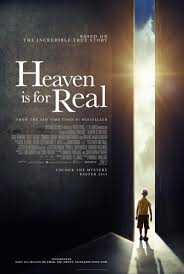
HEAVEN IS FOR REAL
US, 2014, 109 minutes, Colour.
Greg Kinnear, Kelly Reilly, Thomas Hayden Church, Margot Martindale,
Directed by Randall Wallace.
Many people have read the 2010 religious bestseller, Heaven is for Real, by Todd Burpo, the story of his family experiences in 2003. It was on the bestseller list for a long time – and this film version spent several weeks in the box office top 10 in the United States.
However, this is very much a niche audience film. It is for an audience that values religious experience, in the Christian tradition, especially the Bible-based preaching churches with their often literal interpretation of the texts. The tone of the film is particularly American in the sense that it wears its heart on its sleeve, something which even sympathetic audiences from outside the United States might find cloying at times.
And, one piece of consumer advice would be “not for the non-religious and definitely not for atheists”.
The film was adapted from the novel by its director, Randall Wallace. Wallace achieved some success with his screenplay in 1995 for Braveheart. He went on to direct the Vietnam war film, We Were Soldiers, as well as the Leonardo Di Caprio Man in the Iron Mask. Wallace has solid Hollywood credentials as do his cast, led by the always sympathetic and reliable, Greg Kinnear. The British Kelly Reilly plays Kinnear’s wife.
The opening is rather mysterious, a young artist in Lithuania painting a picture of an eye. Then the action transfers to Nebraska. It is only after an hour or so that one remembers there has been no further explanation about the Lithuanian girl – but that is kept until the end. We see Todd Burpo and his hands-on work around the town of Imperial, Nebraska, his coaching a wrestling team at the school, with his family at home, and then he is revealed as the local pastor, in a church where he appeals appears casually in open-neck shirt, sleeves rolled up, and ordinary down-to-earth character. His wife leads the choir.
As the film builds up this portrait of an American family – if Norman Rockwell had lived to the present and had made movies instead of painting pictures, he might have portrayed a family like this. It is not as if they are perfect, and they have great difficulties in making ends meet, but they are a sympathetic, struggling family.
For the readers of the book, they may be waiting for attention to come to the fore with the four-year-old son, Colton Burpo (Connor Corum). Those who don’t know the story will be surprised that the rest of the film is the backup of the title, Colton having surgery for his appendix, very ill but not having a near death experience, explaining to his father and then to others that he had seen heaven and had met Jesus.
Audiences may be uncomfortable with these experiences of a four-year-old, especially as they are repeated and become more precise, Colton knowing more about his family, even of a miscarriage and of his grandfather’s name, than he could possibly know. He is blithely, and cutely, unaware of any problems with this.
This challenges his father’s understanding of religious experience and tests his faith. His wife treats it as a mystery and does not try to understand until she too is challenged by some of the information. Todd has been a fine preacher, people responding to his earthy gospel explanations and inspiration, but finds that he cannot preach. He has friends in the town who are sympathetic to him, but some of the members of the Church Board have real difficulties. Audiences listening to the discussion at a Board meeting will sympathise with Nancy (Margot Martindale) who has lost her 19-year-old son in war and voices some of the difficulties that the audience may have. She also says to Todd in his anguish, “you don’t have to save the world, it’s already been saved”. The screenplay does not entirely shy away from rational critiques and challenges.
There are more things in many people’s philosophy than people might be dreamed of. So what is this kind of heavenly experience for a young child, which could serve as a witness to transcendence, to God and to heaven? One of the insights that Todd Burpo has in preaching about his son’s experience of heaven comes from the words from the Lord’s Prayer, “on earth as it is in heaven”. If we look at the heavenly things we experience on earth, then heaven could be like this, for real.
Finally, it is back to the girl in Lithuania and her paintings, especially of Jesus, whom she continues to paint – actually, an interesting interpretation of the face of Jesus, not exactly Semitic, but striking in its way.
On the way out of the film, I heard some older people saying they were glad that they had seen the film and that it was worthwhile.
1. The popularity of the book? Bestseller? Adaptation for the screen? The director, his adaptation, his career in writing and directing?
2. The niche audience, a Christian audience, American, evangelical?
3. The prologue, Lithuania, the girl, her age, 18, looking in the mirror, the eye, its colour? The screenplay leaving her but bringing her back at the end?
4. The transition to Nebraska, the visual beauty of the countryside, the fields of crops? The town of Imperial? Workplaces, streets, building sites, herbs and repairs? The Burpo home? Exteriors and interiors, the wrestling all, the church, the board meeting room, the hospital?
5. The musical score, the use of many traditional hymns?
6. The visuals, realism, the imagination, for heaven? The place, people, the representation of Jesus?
7. The context of Imperial? Todd and his work, fixing things, jobs, times been difficult, money not coming in? His friends, paying in kind? The bank, his friendship with Jay, at the church, at the bank, Todd and his not accepting alone? Todd and Sonia, Colton and Cassie, ordinary people?
8. Todd in the church, the large congregation, in shirtsleeves, informal? The Hobley church? The choir practising at home – and Colton and Todd going to get pizza? Sonia her conducting the choir, Colton in the choir? Preaching, texts, stories, skill in communication, inspiration?
9. The situation of the church, the need for money, the church board? Relying on Todd and his drawing people?
10. Nancy and J, their friendship, at the services, playing the organ?
11. The difficulties in making ends meet, tide and the injuries, being out of action, limping, the stick, collapses, hospital, kidney stones and the pain of passing them?
12. Colton, a cute little boy, been taken to hospital, anxiety about his operation, Sonia phoning, told and is going to the chapel and his outburst against God? Colton later telling him that he saw these events? The support of the church?
13. Fulton, recovering, is talking about heaven? Todd’s reaction? Kelly’s reaction?
14. Colton, recovering, further stories about heaven, but the grandfather and his name, about the miscarriage? This news shocking Sonia?
15. The effect on Todd, faltering in his preaching, having to give up? People’s reaction? Scepticism about heaven? The discussions with Sonia, who wanting it to stay a mystery?
16. The newspaper article, the photo? People’s reaction in the town? Jay and his reaction, Nancy? The television? The media handling of the situation? Todd allowing the media? Sonia wary?
17. Nancy, her reaction, her scepticism, calling the board meeting, asking Todd to get a new job? Talking with Todd, the story of her son, his death? Mellowing? Reminding Todd that he did not have to save the world, that it was already saved?
18. The finances, concern, Sonia and her reaction? Talking with Todd?
19. Todd regaining his confidence, preaching, people coming, Michael and Rosa and their continued support (and Sonia’s gift of the jacket for the baby, indicating Harrow grief about the miscarriage)?
20. The discussion about heaven, whether people understood it or not, with was personal to individuals, the possibilities that there was more than we could dream of, the visualising of heaven, especially in Jesus?
21. The return to the little girl in Lithuania, the continued paintings, her portraits of Jesus? Colton recognising the same picture?
22. The religious response to the film? Nonreligious? Non-believers? Scepticism or openness?
Published in Movie Reviews
Published in
Movie Reviews
Tagged under
Saturday, 18 September 2021 19:50
Henderson Monster, The
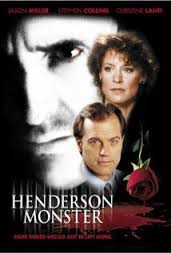
THE HENDERSON MONSTER
US, 1980, 105 minutes, Colour.
Jason Miller, Christine Lahti, Stephen Collins, Nehemiah Persoff, Larry Gates, Josef Sommer, David Spielberg.
Directed by Waris Hussein.
The Henderson Monster is not so much a horror film as film presenting scenarios about viruses and the breaking out of disease. With the title, and the discussions by the doctors, especially by the doctor who experimented with the viruses and flushed material down the sink with disastrous results, it seems something of a variation on microphone off or the Frankenstein story. It has a good cast. And it pre-dated some of the more up-market films about viruses, diseases, doctors playing God, the consequences.
The film was directed by Waris Hussein the British director in the 1960s who moved to the United States and worked mainly in television movies.
1. An entertainment with a serious message? Genetic engineering?
2. Made on television, popular, incorporating the serious discussions in the entertainment?
3. The Frankenstein references, Mary Shelley, the issues, vision, Henderson and “playing God”? The moral issues? Louise and her assisting Henderson? The Boris Karloff overtones? “Baron”?
4. Science fiction, science reality? DNA? Life, creation of life? Scientific progress? Who is to do this, documented? Judgements, safeguards? Human life?
5. The parallel with nuclear issues? The validity of this kind of research and experimentation?
6. The plot, grants, the experiences, the settings in the sittings, relationships? Protests?
7. The importance of talk, the issues, discussions? Persuasive? Incorporated into the plot?
8. Henderson, the background of the Nobel prize, his ego, rivals, working with Louise, relationships and presumptions about sexuality? His carelessness
about the law? Arrogance? The Mayor, the committees? Speeches? Leo? Attacking Louise? The verdict?
9. Louise and her husband, who work and dedication, suspicions? Pete, his character, his emotional reaction, accusations about “playing God”?
10. The President, the Mayor, officials, their responsibilities? Interacting with Henderson?
11. The other doctors, scientists, the research, rivalries, experiments?
12. The moral issues and their being dramatised? The critique of those who wanted the film to be a film rather than an exploration of scientific research and experiments?
Published in Movie Reviews
Published in
Movie Reviews
Tagged under